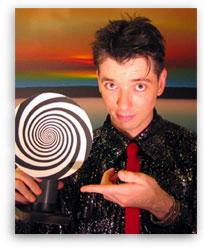
|
 |
“Get Real” — The Most Important Feat of Magic?
by Craig Conley, for Secret Art Journal
When the latest news from quantum physics (and frankly the oldest news from Buddhism) proclaims that the universe is one big illusion, the magic community might get a certain thrill: the entire universe, literally the oldest trick in the book?! But then a sinking feeling: do magicians need to stop striving to be real professionals, real successes, if nothing is genuine? More troublingly, could a mindset that the universe is an illusion tend to foster disconnection?
We know from study after study that members of contemporary society feel alienated and isolated; in spite of technological tools for instant communication, people feel lonelier than ever. A tough question for magicians might be: do the message centers and in-boxes of our various apps feel unreal, like spirit messages from the seances of old? Surely few to zero modern magicians actually believe in the tenets of Spiritualism, yet — in brutal truth — we are all guilty of severe lapses in real connection, of treating people’s attempts at communication as illusory.
Profoundly unlike quantum physics and Buddhism, the ancient philosophies of Shinto and Judaism tend to be down-to-earth, examining the universe as very real. Without mincing words, that’s rather frightening. Everything real? We actually have to confront all this? The house lights won’t come back on at the end and remind us that it’s all been a bit of clever theatre? Talk about overwhelming! It sure is easier, vastly more comforting, to dismiss it all as illusion. Yet ... yet ... where does that leave us? Perhaps one truly is convinced that we’re in a computer simulation or, as Philip K. Dick suggested on more than one occasion, a schizophrenic’s hallucination; even so, can one at least play at expressing free will? Can one seek a lucid existence, even if (or especially if) this is all a dream? If so, then could there perhaps be some valid point in fostering connection, if only to make the hologram shimmer that much more in lifelike 3-D?
Which is all to say — could one of the most important feats for magicians to tackle be the restoration of society-wide connection? Even the busiest world-touring magicians aren’t technically too busy to keep closely in touch with their confederates and acquaintances. To name a single proof of that: Jeff McBride. Anyone seriously busier than Jeff McBride deserves special dispensation. Everyone else might benefit from some lessons in time management and some readings on empathy. Yet a crucial point should be clear: making connections isn’t for them, it’s for you. “Networking” is such a loaded term; it sounds self-serving at best, implying professional and not personal bonds. Perhaps many folks put the cart before the horse, not realizing that seemingly casual, personal connection can be the most powerful networking of all. Even if the universe is the Matrix, why not interconnect more lines?
E. M. Forster famously implored that we “Only connect” (Howards End, 1910). The sentence that precedes that is, “Live in fragments no longer. Only connect ....” Not that we need yet another commandment from on high, but mightn’t there be something to this one?
As I write this, I’m as haunted as a genuine believer in Spiritualism. At least half a dozen cherished magicians, people I not only admire but sincerely love, people with whom I’ve been honored to collaborate, whom I’ve supported and promoted — have become phantoms in my world. They haven’t passed to the “other side,” but, in conjunction with societal-wide disconnection, they have made ghosts of themselves or of me. And the one trick I dream of seeing from all of these fine individuals is to re-materialize, to “get real.”
Craig Conley, a.k.a. Prof. Oddfellow, is author of Magic Words: A Dictionary, The Young Wizard's Hexopedia, Seance Parlor Feng Shui, and dozens of others. His website is MysteryArts.com.
|
